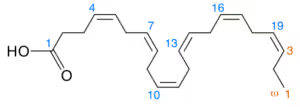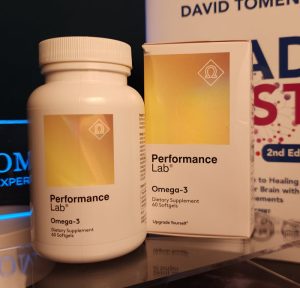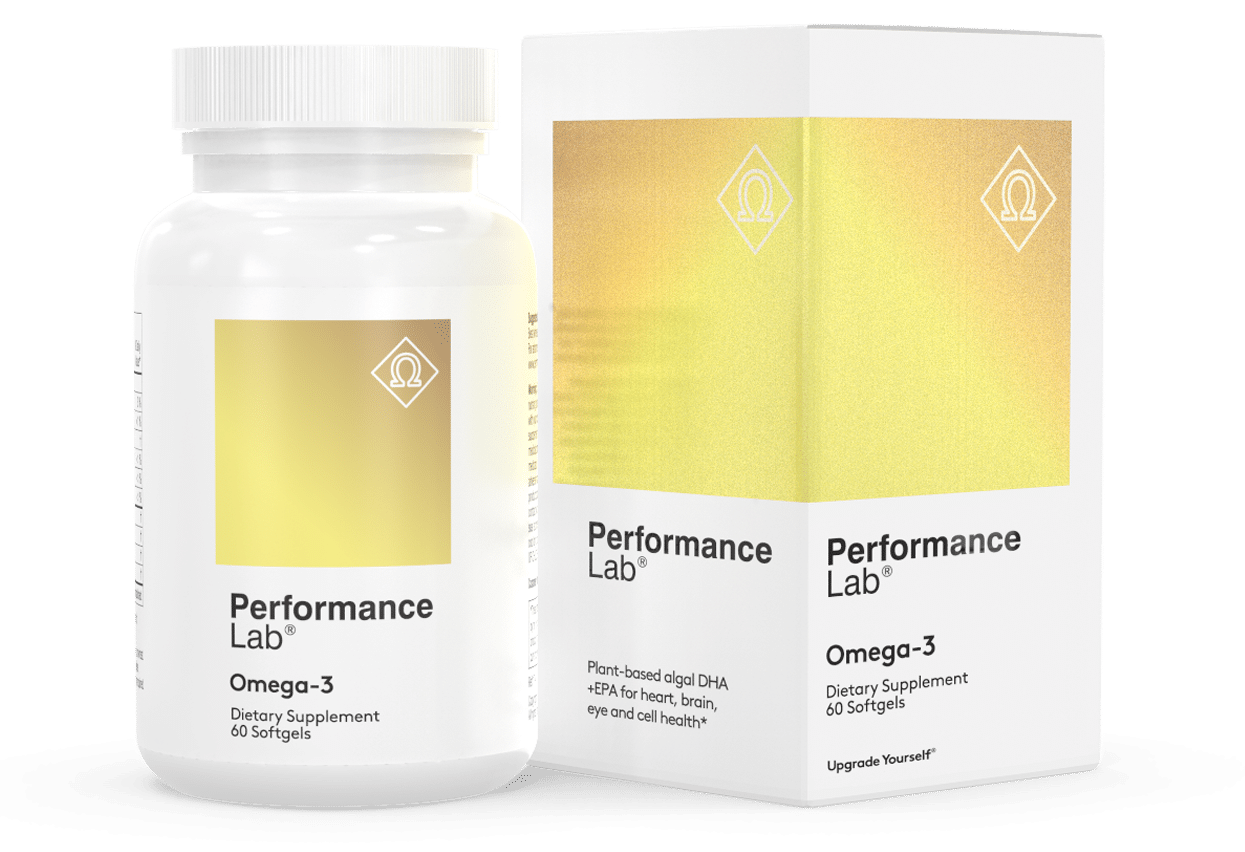Table of Contents
DHA (docosahexaenoic acid) is an omega-3 fatty acid. DHA is crucial for the healthy structure and function of your brain at all ages.
DHA impacts your brain’s signaling systems, neurotransmitters, memory, learning, focus and attention. It helps reduce and even repair cognitive decline.
The best algae-sourced DHA on the market today is Performance Lab® Omega-3 which contains 600 mg of DHA and 300 mg of EPA per dose.
The famous Framingham Heart Study followed-up with 899 men and women who were free of dementia. Subjects had a median age of 76 years. And were followed for 9.1 years for the development of dementia and Alzheimer’s Disease.
Results from the study showed 99 new cases of dementia including 71 of Alzheimer’s. The researchers concluded that those with the highest levels of DHA were “associated with a significant 47% reduction in the risk of developing all-cause dementia”.[i]
DHA helps:
- BDNF. Brain-derived neurotrophic factor (BDNF) is your brain’s growth hormone. DHA has the ability to turn on your brain’s BDNF.
- Neuroplasticity. DHA helps your brain build new neural pathways. Critical for maintaining a healthy brain. And optimizing neural signaling and cognition.
- Neuroprotection. DHA acts as an anti-inflammatory by reducing the enzyme COX-2. Inflammation is a key factor in both Alzheimer’s and Parkinson’s Disease. And in every other neurodegenerative disease.
Overview
DHA (docosahexaenoic acid) is an omega-3 fatty acid. Your brain is made up of 60% fat. And much of that fat is DHA.

Your body does not make DHA on its own. So you must get it from food or a supplement. And if you are a vegan, you are at serious risk of a life-threatening DHA deficiency.
Foods that are rich in DHA include fish, fish oil, Krill and other crustaceans, and algae.
But fish do not make DHA. Fish and other marine predators get it from smaller fish and crustaceans that feed on algae. It’s algae that has the enzymes to produce DHA that we need to remain healthy.
The best algae-sourced DHA on the market today is Performance Lab® Omega-3 which contains 600 mg of DHA and 300 mg of EPA per dose.
DHA from eggs and some dairy products only supply about 20 mg of DHA per day.
DHA is essential for maintaining brain health, memory and learning functions. DHA reduces brain inflammation, stimulates new nerve cell growth, and assists in brain cell repair.
How does DHA Work in the Brain?
Your brain is composed of 60% fat. 15 – 20% of your cerebral cortex is DHA. Even the retina in your eyes is 30 – 60% DHA. Making DHA the most essential nutrient for eye and brain health.
The highest levels of DHA are found in phosphatidylserine (PS) and phosphatidylethanolamine (PE).[ii] Lower levels are found in phosphatidylcholine (PC).
PS makes up about 70% of neuron tissue mass. It helps in the storage, release and activity of neurotransmitters and receptors.
PC also makes up part of the neuron tissue mass. And helps in maintaining cell structure, fat metabolism, neuron signaling and the activation of a number of enzymes.
And PE is part of neuron cell membranes. PE is involved in cellular signaling.
PS, PE and PC are called phospholipids. Together they alter the fluidity of cell membranes. Changing the fluidity of cell membranes alters their permeability and protein activity. And influences cellular signaling.
Made up largely of DHA, these cellular membranes regulate entry into the cell, and control neuroreceptor function. Which facilitates cellular communication between, and within cells.
DHA also reduces inflammation by regulating proteins and enzymes within cells. And boosts the production of anti-inflammatory compounds that protect cells.
DHA maintains the activity of certain enzymes that control electrical signaling between cells. And it regulates the brain cell concentration of PS which is vital for cell survival.
And DHA regulates calcium oscillations, which are involved in neurotransmitter release, mitochondrial function, gene activation, oxidative stress and brain cell development and growth (BDNF).
DHA vs. EPA: What’s the Difference?
Most medical authorities and scientists agree that Omega-3 oils are important for good health. Omega-3s boost brain function, decrease inflammation, reduce the incidence of fatal heart attacks and strokes, help autoimmune diseases and improve vision.
 We have general agreement about the health benefits of Omega-3 oils. But few appreciate the difference between DHA (docosahexaeonic acid) and EPA (eico-sapentaenoic acid).
We have general agreement about the health benefits of Omega-3 oils. But few appreciate the difference between DHA (docosahexaeonic acid) and EPA (eico-sapentaenoic acid).
The ratio of DHA and EPA varies a lot in commercial Omega-3 supplements. Most have higher concentrations of EPA to DHA. Mainly because it’s cheaper to manufacture, and has less of a fishy odor.
But studies show that most of the brain health benefits of Omega-3’s are derived from DHA rather than EPA.
One study in Chicago followed 815 residents from 1993 – 2000. Study subjects were between 65 and 94 years. 131 study participants developed Alzheimer’s Disease. Those who ate fish at least once a week had a 60% less risk of Alzheimer’s compared to those who didn’t eat fish.
Researchers found that it was the intake of DHA rather than EPA that reduced the risk factor in getting Alzheimer’s. EPA made no difference whatsoever.[iii]
How Things Go Bad
From reviewing the “How does DHA Work in the Brain” section of this article, you can imagine that when things go bad with DHA – they go really bad.
Fish and marine oil supplements like krill oil are a source of DHA and EPA because they get it from algae. Plants contain another Omega-3 called alpha-linolenic acid (ALA).
Technically ALA can be converted to DHA and EPA. But most modern humans lack the ability to convert plant sources of Omega-3s into all the DHA our brain needs.
When we don’t get enough DHA, we experience:
↓ Problems with attention, learning and memory
↑ Depression, anxiety, aggression, anger, suicide risk
↑ Bipolar disorder, Alzheimer’s Disease and Schizophrenia
Not having adequate levels of DHA in the brain cause things to break down. If the inadequate intake of DHA goes on for a while, disease starts to set in. Including neurodegenerative diseases like Alzheimer’s and cancer.
DHA benefits
DHA makes up much of the gray matter in your brain. It’s an integral part of cell membranes and their function.
Your brain is 60% fat. And a large part of that is DHA.
The good news is; degenerative conditions can not only be prevented by adding DHA to your nootropic stack. It can also be reversed.
In one study, researchers worked with 485 elderly subjects with memory problems. They saw significant improvement with those taking 900 mg of DHA per day for 24 weeks compared to the control group.[iv]
In another double-blind, placebo-controlled trial, scientists worked with 49 women aged 60 – 80 years. One group received 800 mg per day of DHA for 4 months.
Researchers found those using DHA had a significant improvement in verbal fluency scores. And an improvement in memory and learning.[v]
How does DHA feel?
Chances are when you start using DHA you won’t feel it. There’s no profound stimulant feeling.
But if you suffer from chronic depression, within a few weeks you should feel the depression lift.
After supplementing with DHA for a while your cognition will be better. You’ll think clearer and quicker. Your memory and ability to learn will improve. And you’ll likely have more energy and motivation.
But it is very likely you won’t think to attribute these improvements to adding DHA to your stack. Something else will get the credit.
DHA Clinical Research
DHA is crucial for an optimally functioning brain. The goal of every neurohacker. DHA impacts your brain’s structure, signaling systems, neurotransmitters, memory, learning, focus and attention.
We have decades of clinical research verifying the importance of DHA in your nootropic stack. And several books have been written on the subject in the last couple of years. Here’s just a snippet of what’s available…
DHA Reduces Hostility and Anger
In a study with 41 university students in Japan, scientists compared a high-DHA diet (1.5 grams/day) with placebo. This was recorded over 3 months to see the effects on hostile responses.
The researchers found a 27% incidence of hostile answers in the placebo group when nothing extraordinary was going on. And hostile responses rose to 92% during final exams.
There was no increase in hostility among those taking a DHA supplement. These guys even found DHA supplementation significantly reduced hostility among university staff.[vi]
DHA Restores Neurotransmitters & Memory
As your brain ages, there is an increase in membrane rigidity. This causes changes in synapses resulting in a decrease in transmitter release. Long-term potentiation is affected which impairs the development of memories.
Several studies have shown that DHA can support healthy levels of these neurotransmitters. In one study with aged rats, researchers restored neurotransmitter release in the hippocampus. And reversed age-related memory problems.
Adding omega-3 fatty acids to the rat’s feed for 8 weeks raised concentrations of DHA in the rat’s brain. And actually reversed age-related memory impairment.[vii]
DHA Improves Attention & Learning
DHA also has an effect on neurotransmitters serotonin, norepinephrine, acetylcholine, glutamate and dopamine. Deficiencies in DHA have been shown to lower levels of dopamine. Resulting in problems with attention and learning.[viii]
DHA even plays a role in neurotransmitter receptor function. DHA affects brain cell membrane structures including neuroreceptors.[ix]
Some of these receptors communicate inside cells when stimulated by glutamate, serotonin and acetylcholine.[x] The numbers of these receptors can be increased by you, by adding DHA to your nootropic stack.
So if you are using nootropics that affect things like acetylcholine, serotonin, dopamine and serotonin in your brain. It would be wise to add DHA to your nootropic stack. And ensure you get the most bang for your investment in nootropics.
DHA Recommended Dosage
Recommended daily dosage of DHA is 1,000 mg.
Fish oil supplements vary in ratios of DHA to EPA. Salmon naturally contain more DHA than EPA. A supplement from algae may contain only DHA.
Krill oil provides both DHA and EPA. So read the labels. And whatever supplement you get, make sure you end up with at least 1,000 mg of DHA.
And recall that fish and krill do not produce DHA on their own. Marine life get their DHA from algae in the wild.
Most brands of fish oil have been proven safe, and free of mercury. And do not contain unsafe levels of PCB’s (polychlorinated biphenyls).
To further avoid the contaminants in an unrefined supplement, choose a fish oil or Omega-3 supplement made from small, oily fish like anchovies, sardines or menhaden. And check the labels carefully for purity.
Ideally, get one of a few supplements now available that are pure, refined DHA. With lower or minimal amounts of EPA.
DHA Side Effects
Fish oil capsules commonly have both DHA and EPA. Capsules with EPA are not recommended for infants or small children. Because they upset the balance between DHA and EPA during early development. This also applies to pregnant women.
Fish oil could cause minor side effects like loose stools, upset stomach and belching.
Fish oil may lower blood pressure. So if you already take a medication to lower blood pressure, make sure you talk to your doctor first.
If you’re supplement contains EPA, it could interact with blood thinners and increase bleeding. Same is true for aspirin. But this is not true of DHA. DHA-only supplements do not thin the blood.
Fish oil supplements may lower blood sugar levels. So be careful if you’re on diabetes medications.
Omega-3 fatty acids may reduce some of the side effects of cyclosporine which is used to stop rejection after an organ transplant.
Type of DHA to Buy
 DHA is available as a supplement in two forms:
DHA is available as a supplement in two forms:
- Fish oil or Omega-3 capsules. Which usually have both DHA and EPA. Most Omega-3 supplements contain higher amounts of EPA compared to DHA. But for our purposes, and to support cognitive health, we need an Omega-3 supplement containing higher amounts of DHA to EPA.
- DHA from fish oil. Some supplement manufacturers now offer capsules containing higher amounts of pure, refined DHA. And reduced amounts of EPA. Our brains require 1,000 mg DHA per day. So look for a DHA supplement that provides 1,000 mg DHA in 2-3 gelcaps.
- DHA from algae. Which may or may not contain EPA and is vegetarian friendly. Algae is the natural source of these Omega-3s in the wild and where fish and other marine life get their Omega-3s.
For as little as $49/month you can experience better cognition, memory and mood simply by using a daily DHA supplement. My favorite is Performance Lab® Omega-3 which contains 600 mg of DHA and 300 mg of EPA per dose.
Performance Lab® Omega-3 contains life’s™ OMEGA algae oil which supplies natural triglyceride Omega-3s that are 70% more bioavailable than synthetic ethyl esters used in cheaper and lower quality Omega-3 fish oil supplements.
Performance Lab® Omega-3 is delivered in NutriGels which are vegan, carrageenan-free softgels. No fishy smell or aftertaste and easy on your digestive system.
Try a bottle today: Performance Lab® Omega-3
Nootropics Expert Recommendation
DHA (Omega-3) 1,000 mg per day.
 I recommend using DHA as a nootropic supplement.
I recommend using DHA as a nootropic supplement.
Your body does not make DHA on its own. So you must get it from food. Or take it as a supplement.
DHA is one of the most important nootropics you can add to your stack. Your brain is 60% fat. And much of that fat is DHA.
DHA is critical for brain cell repair and regeneration (neurogenesis). And it is an integral part of neural signaling. Both between neurons as well as inside brain cells.
DHA has an effect on critical neurotransmitters and neuroreceptors. It is a powerful anti-inflammatory. And is involved in neuroplasticity.
Hundreds of studies on Omega-3s and DHA show benefits in preventing and even reversing neurodegenerative disease.
It’s best if you find a supplement that contains twice as much DHA than EPA. Such as Performance Lab® Omega-3. And you can safely take 1,000 mg of DHA per day.









Join The Discussion - 220 comments
James
July 10, 2019
I take a tablespoon of Carlson’s Cod Liver oil every morning which is about 3,000mg of EPA/DHA combined. I like the additional Vitamin A and D. Is this dose ok for long term use? I am a powerlifter so I feel the larger dose is good for me.
David Tomen
July 10, 2019
James, do you know what the exact dose is of EPA and DHA in this supplement?
James
July 18, 2019
500mg of DHA and 400mg of EPA in 1 teaspoon.
David Tomen
July 19, 2019
James, if you are not feeling any negative effects with the dosage you are currently using then I see no problem.
Zak
June 16, 2019
What dosage do you recommend for taking both DHA and Phosphatidylserine (PS) per day?
David Tomen
June 17, 2019
Zak, 1,000 mg DHA per day and Phosphatidylserine (PS) dosage is 100 mg 3-times per day.
Joe
May 8, 2019
I suffer from general anxiety and panic attacks. Also, very fatigued. In general good health. I have been trying many supplements with little luck. I react to almost everything I put in my body. I tried calamarine which is mostly DHA and had a terrible panic attack shortly after. Only about 500 of DHA. Any suggestions?
David Tomen
May 9, 2019
Joe, please see this post on anxiety which explains the different causes for anxiety: https://nootropicsexpert.com/best-nootropics-for-social-anxiety/
Instead of guessing on what might work and trying different things, I suggest a more methodical approach. Try a nootropic for boosting each neurotransmitter described in that post. But do them one at a time until you discover what could be at the root of your anxiety. Once you narrow that down then you can start working on that pathway and trying nootropics that work on that specific part of your brain that needs support.
If you could use some help I do offer personal consultations that may speed up your recovery: https://nootropicsexpert.com/personal-consultations/
gary sanchez
April 10, 2019
Hi David great write up!
In the article you mention “The highest levels of DHA are found in phosphatidylserine (PS) and..” Every study i’ve read states that DHA is combined with PS to build phospholipids (therefore you still require a DHA source as it is not provided by PS). Could you re-check if this is true?
Thanks!
David Tomen
April 11, 2019
Gary, researchers are still working on how exactly this process works. But we do know for sure that supplementing with DHA will increase Phosphatidylserine (PS) in cell membranes. https://www.ncbi.nlm.nih.gov/pmc/articles/PMC3383770/
Infinity Lai
March 19, 2019
Should I cycle DHA? Or I can take it every day?
David Tomen
March 20, 2019
No need to cycle DHA. Your body needs it every day.
Ron
March 15, 2019
Hi David,
I’ve been enjoying all your articles and videos.
I thought I should call your attention to the TEDxEmory talk by Dr. Steven Ilardi, who said that EPA rather than DHA was effective for treating depression. (https://www.youtube.com/watch?v=drv3BP0Fdi8) Is his book “The Depression Cure” he recommends fish oil with twice as much EPA as DHA.
I looked to see if I could find any studies to back that up, and came across this: https://www.ncbi.nlm.nih.gov/pubmed/21939614/
I suspect that the composition of EPA and DHA may need to vary based upon the effect you are trying to achieve?
Thanks for all your work!
David Tomen
March 15, 2019
Ron, I think your concluding remark is sound based on some of the recent research I’ve seen.
But if you re-read this review it’s clear that DHA is integral to the makeup of brain cells. And not EPA. So some of this doesn’t make sense logically and no one has offered an explanation of the pharmacology or mechanism of action involved in the brains of subjects.
One thing I’ve learned about many of these clinical studies on ‘natural’ nootropics – what exact supplement did they use? How pure was it and how much was used?
The other thing you keep in mind is nearly all clinical studies are done with sick people. So all we can do is extrapolate a conclusion from a study on how effective a supplement could be in a reasonably healthy person.
Faisal
February 27, 2019
Hi David,
I hope you’r fine and doing well.
I a believer in DHA importance, and used it with range between 1000mg to 1500mg without issue.
my problem is that I am taking a strange type, which is Dr.Best Calamarine.
the article of this product claim that DHA must have ratio with EPA
and EPA must be less 10 times or you will get a bad impact on all brain cell structures and walls.
I am wondering about this claim?
we agree that DHA is more important than EPA for mind and eyes health.
but we can take both of them in different ratio, Please I need a real evidence that increase EPA over DHA have bad impact.
because I am thinking to shift to Life Extension Super omega fish oil, which include olive extract as well.
this change I can’t do it if there is real evidence from trusted source ensure and confirm that DHA must be in more ratio than EPA.
Thanks for your efforts again.
Regards
David Tomen
February 27, 2019
Faisal, see this section of the above review first: https://nootropicsexpert.com/dha/#dha-vs-epa-whats-the-difference. And click through to the study done in Chicago on their conclusion.
Then go back to this section and notice that there is NO mention of EPA: https://nootropicsexpert.com/dha/#how-does-dha-work-in-the-brain
Plant-based oils like Olive Oil provide alpha-linolenic acid (ALA). And technically ALA can be converted to DHA and EPA. But most modern humans lack the ability to convert plant sources of Omega-3’s into all the DHA our brain needs.
The body does require a certain amount of EPA along with DHA. But for brain health and cognition, DHA is most important.
Erik
January 30, 2019
David,
I take a Triple Strength supplement from Nootropics Depot
OMEGA-3 FISH OIL TRIPLE STRENGTH 1000MG SOFTGEL CAPSULES
Serving Size: 1 Softgel Capsule Amount Per Serving % Daily Value
Calories 9
Calories from Fat 9
Total Fat 1g 2%
Cholesterol 10mg *
Total Omega-3 750mg *
EPA (Eicosapentaenoic Acid) 325mg *
DHA (Docosahexaenoic Acid) 325mg *
Other Omega-3 100mg *
Total Omega-6 50mg *
Total Omega-9 10mg *
I’ve always had Fish Oil supplements in that range and seem fine, i tried a DHA supplement from Nootropics Depot it had 550mg of DHA in it, i got brain fog within 30 min, is that a common occurrence?
David Tomen
January 31, 2019
Erik, brain fog from a DHA supplement is NOT a common occurrence. It could have been a bad batch of DHA. I suggest trying another manufacturer at the same dosage and see what happens. If it happens again then this may be the rare instance that high dosage DHA supplements are just not for you.